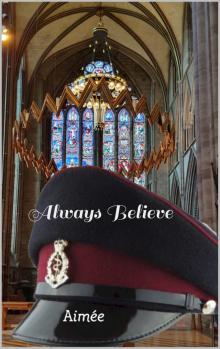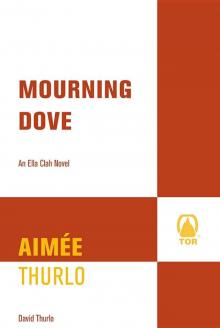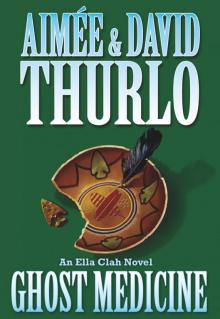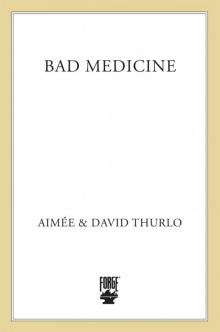Always Believe Read online
Page 2
Her good deed – if one could call it that – had not gone unpunished. Every time she visited the care home where her mother was now living, she wondered about the wisdom of her choice. Because there too, she felt useless, worthless. Greyson’s mother had been experiencing symptoms of Alzheimer’s disease for a few years – since, in fact, her husband’s death from a heart attack. Like many doctors, her father had ignored all warning signs, and the cardiologist had succumbed to a massive attack, alone in his practice, unable to call for help. She had been working at the 22 Field Hospital near Aldershot, and at first she had tried to come home to her widowed mother every fortnight or so. Not that her mother had been grateful. In fact, she had often driven home in tears after an unsuccessful visit where her mother had ranted and raved at her and almost thrown her out of the house. And then, she had fallen on her icy front steps and had broken her hip. No one would ever know exactly what had happened – Greyson suspected the general anaesthesia, but after a stay in a physical rehab facility, there had been no question of Mrs Walsden returning to live at home on her own. Her mind had severely deteriorated and more often than not, she didn’t even recognise her own daughter anymore.
Greyson had agonised over the best way to care for her mother. One obvious choice would have been for her to move back home, but she couldn’t face becoming a full-time carer for a mother who had never had much time for her in her life. She had decided on a middle-ground – she had found a retirement home specialised in dementia patients and had quit the military in order to move back, not to her parents’ home but at least to Gloucester, a few miles from the care home. Even though each visit to her mother put her through the wringer, she at least told herself she was doing the right thing. Her feeling of inadequacy, however, had not been in any way alleviated. Each time her mother tried to swat her away or told her in a cross voice that “her no-good daughter Greyson hadn’t come to see her that week”, she wanted to go away and cry or scream. Even though her medical studies had taught her about Alzheimer’s, she had never realised exactly how painful an illness it was for the family.
The one thing Greyson really hated about her flat was not its small size or its bareness but its shower. When she came back from the shelter, or from the care home, she wanted nothing more than to take a long shower – piping hot in winter and ice cold in summer. In these early July days, the weather was clammy and the heat stuck to clothes and hair – almost as bad as it had been when she’d been in deployment in Africa. However, she hadn’t expected her bathroom in England to be almost worse than the shower units she’d had to deal with on the bases. The shower-head was firmly embedded in the wall and the lukewarm trickle of water it emitted could neither cool her down nor soothe her sore muscles. Therefore, she either spent only a few minutes under it, cursing its uselessness, or ages, trying to get the grime of the day off her as best as possible. It was usually when she was engaged in rinsing herself thoroughly that her phone rang, and that day was no exception. She had been lost in her thoughts and the ringtone startled her into wrenching her back and banging her elbow in the narrow shower cubicle. She cursed and answered the phone on a tone that would have made a whole regiment shiver, before apologising as best as she could to Reverend Jones, who just wanted to wish her luck for the next day. The first real day of her new life. She would need luck. The position at the homeless shelter had the advantage of being a part-time one, which left her time to pursue her other objective – the other reason why she had left the army.
That evening, as she went over her notes again and again, committing the words she had written to memory, she felt almost sick with loneliness. The phone call from the kindly Reverend had only underlined the knowledge that no one else would be thinking of her on the day she was embarking on this new part of her life. When she had left the military hospital, she had also severed the ties to her colleagues there – she wanted no reminders of her old life. She didn’t want them to tell her about their interesting new cases, about their work dos, about births and weddings. She had seen too many people die to get attached. The result was that she was alone in the world now. Or almost alone – during her early days in the Forces, when she had not yet had time to become jaded, and when she had still been naïve enough to believe that others could die but not her, she had accepted responsibility for someone. Julie, who was now sixteen, and like many adolescents, oblivious to anything and anyone but themselves. She would probably have to visit her sometime soon, though. She had promised the teenager’s parents she would.
She missed the easy companionship she had enjoyed in the army. She hadn’t made many real friends, except Julie’s parents and a few other people, all still serving. She had no real time to socialise with the other shelter workers outside work and none to make friends elsewhere. Maybe she should have chosen to become a nun – at least she would have had ready-made friends in the sisters of the convent. The only problem was that she would hate the discipline and the communal living. It wasn’t that different from the army, actually, but obedience and keeping her mouth shut didn’t come easily to her. The path she had chosen was hard enough…
Chapter 3
“Remember me when no more day by day / You tell me of our future that you plann'd /Only remember me; you understand
It will be late to counsel then or pray. /Yet if you should forget me for a while / And afterwards remember, do not grieve:
For if the darkness and corruption leave / A vestige of the thoughts that once I had, /Better by far you should forget and smile/ Than that you should remember and be sad.” Christina Rossetti
Angela would have to resume her life – she couldn’t stay hidden at home forever. She needed the income – the mortgage wouldn’t pay itself, and the bank didn’t care her daughter had died. However, just the idea of setting foot in a school again gave her a nauseous feeling. She pictured herself standing in front of her students – just a few years older than her daughter – and trying to interest them in Shakespeare or the intricacies of English grammar. Not that she did a lot of teaching nowadays. Since she had become headmistress of St Hilda’s – a 6th form residential college - almost eight years before, she taught only a few hours per month. In a way, she missed teaching – she spent most of her time on management and PR. The Trust to which the school belonged had given her one month’s compassionate leave, and that month would soon be up. She would have to face her colleagues and the teenagers again. She just couldn’t see how.
She tried – on the Monday she was supposed to go back to St Hilda’s, she put on her work clothes for the first time in a month. She coated her face with make-up – her war paint - lining her lips with fiery red lipstick and hiding her sleepless nights under concealer. She walked on automatic pilot to the school – that same itinerary she had taken so many times, first alone as a young, eager novice to the world of academia, then with Sybil, whom she had dropped at her primary school gates before work, and then alone again when her daughter had decided she wanted to become a professional dancer. And now alone for ever.
She made it to the front door – even a few steps in the corridor – and then she turned tail and ran. The hubbub of the students massed in the hall rang painfully in her ears, and she knew she couldn’t face them. She nearly went to the pub instead, but she had drunk so much alcohol in the last month that suddenly her stomach rebelled at the idea of a stiff whisky or even a glass of wine. However, she couldn’t face going back home either, so she decided on one of the coffee shops that lined the main street. Armed with a huge cup of black coffee – she just couldn’t understand the point of whipped cream, cinnamon powder or hazelnut twirls – she found a seat and settled down with a book. She had always been able to lose herself in fiction before, but either that novel was particularly bad or her capacity for escapism had vanished with Sybil, along with her enthusiasm for life. She glanced around her – a few students from the local university, several pensioners waiting for the shops to open, mothers with toddlers of pre-school age, and
even a lone woman like herself, who appeared lost in thought. The blonde seemed familiar, and Angela wondered where she’d seen her before. Unable to pinpoint a specific event, she decided she must be a parent – she had seen so many along the years that she couldn’t possibly remember all of them with precision. As she was idly watching her – a quite striking, willowy middle-aged woman - the blonde lifted her eyes and stared right back at her. Angela blushed and averted her gaze, suddenly becoming fascinated with her coffee cup. She ought to think about finding a new job instead of gazing dreamily at perfect strangers. Her mind, however, had other plans. She had wanted to teach English since her own school days – maybe since she had learnt how to read. Somehow the characters she read about tended to pervade her real life, and real people wandered in imaginary settings. At least, for a brief instant, she hadn’t thought of her daughter.
She wondered how much time it would take her not to hear the phone call in her head. Not to imagine Sybil’s key in the door, not to see her dumping her bags in the hall and heading from the kitchen to pounce on the chocolate biscuits she took care to buy for her. When the call from Sybil’s school had come, she’d just finished a budget meeting, where she had had to negotiate for every penny. Not her favourite part of the job. So when her secretary had told her the head from her daughter’s school was on the line, she had nearly bitten her head off – she wasn’t in the mood for a chat. Ms. Watford, the head of Middlefield Dance Academy, had become a friend in the two years Sybil had attended her school, and Angela had immediately sensed something was wrong. Mary Watford’s voice had been shaking and although she had obviously been trying very hard to maintain her professional composure, she hadn’t quite hacked it as she had told Angela she had to come to Middlefield Academy straight away. When she had added that Angela ought to have someone drive her there, Angela had scoffed at the idea and asked for details. Mary Watford had refused to be drawn into more explanations and had reiterated the urgency of the situation. “I’ll be there in two hours”, had snapped Angela into the phone. She had told her secretary to postpone her appointments for the day and had jumped into her car.
During the drive, she imagined everything – if her daughter had broken her ankle or her leg, it could mean the end of a dancing career. Sybil would be distraught. Or maybe her daughter had been bullied. Angela quickly dismissed that thought – Sybil would have told her. The teenager had been moody during her last weekend at home, but Angela had put that down to puberty and hormones. She didn’t think it concerned her grades – Sybil had always been a straight-A student. In fact, Sybil had given her very little trouble over the years. All the better since she had raised her mostly on her own. Sybil’s father had done his best but having a baby had never been on of his priorities. She had known that at the time, and it hadn’t bothered her at all, because it hadn’t been in hers either. She had met James at university – or rather, in one of the pubs haunted by the students in the evenings. The young lanky dark-haired man had come to ask her for a fag and they had bonded over a love of French impressionists and books by Jean-Paul Sartre. She was finishing her PhD in English Literature and he was planning on becoming an artist. He had dreams of living in a garret, preferably in Paris, and painting all day long. Angela becoming pregnant had put an end to his dreams, and since he had been quite fond of her, really, he had found a job as art teacher in a high school. For two years after the baby was born they had lived together in a small flat. It had worked - there had been genuine friendship between them. But they’d both known they wanted more – or something different. They had separated amicably, and he had left for France, where he had found success. He had managed to exhibit his paintings in a small gallery and had caught the eyes of a well-connected patron who’d introduced him on the Parisian art scene. He had met his new wife there – Mélanie, a blonde dentist who looked like a model – and they had had a son together. They came to England frequently and they met for drinks or dinner.
As she went over all the possible reasons for her summons, she never thought of calling James – although he saw his daughter regularly and they got on well, she would face whatever had happened on her own… It couldn’t be that bad. She parked as close as she could to the main school building and she hadn’t even stepped out of the car when Mary Watford came out to greet her. From the look on her face, Angela realised whatever had happened was worse than she had imagined. Even then, though, she hadn’t for a second thought she would never see her twelve-year-old daughter alive again…
A table of particularly noisy tourists settling at a nearby table jolted her out of her waking nightmare. Maybe she should have gone to work – too much idle time was too much time for reminiscing. She couldn’t face going home again and decided to go to the cinema instead. Not that she wanted to see a film – she just needed the noise to stifle her thoughts.
Chapter 4
Two people are better off than one, for they can help each other succeed. If one person falls, the other can reach out and help. But someone who falls alone is in real trouble.[…] A person standing alone can be attacked and defeated, but two can stand back-to-back and conquer. Ecclesiastes 4:9-10,12.
Greyson looked at her new clothes, hanging in her wardrobe. She still didn’t feel comfortable in them. She guessed she would get used to wearing them in time. At least the colour was discreet enough. And they didn’t weight half as much as her old combat uniform or even her dress uniform. She didn’t quite belong to them yet, that was all. They still made her feel like a fraud. She tried not to think of what she had to do… She had always hated public speaking, and she had chosen a path where it would be expected of her several times a week. Even though she had read and re-read her notes, the notes she had crafted carefully, weighing each word and every sentence, her mind felt blank. She checked she had put them away in her briefcase – if her memory failed her, she would have to rely on them when she went up there… All alone before a sea of people.
A few hours later, she settled in a coffee shop and ordered a large black coffee and a muffin. She suddenly felt ravenous, now she had survived. Barely. Her legs had almost given way, her voice had almost failed her, but she had managed. She didn’t really need the caffeine – she was still on a high from the morning – but she didn’t want to go home just yet. The flat didn’t feel like home anyway. She had done it – she could understand what the first man on the moon had experienced. Not that what she had done was anywhere as heroic – in any case, it had been way less dangerous than going to a war zone. But for her it was a huge step – even though the sea of people she had imagined listening to her had consisted of about fifteen mostly female pensioners.
She had sent an email to her goddaughter, asking whether she wanted to do something with her that afternoon but had felt quite relieved when the teenager had told her she had a badminton competition at the school. She didn’t really know how to talk to teenagers, and she had had little contact with Julie over the years, due to the many months she had spent in deployment abroad. Moreover, despite the huge amount of sugar and coffee she had just consumed – she had added a chocolate bar to the muffin – she kept yawning and her whole body felt weary. She finally decided to go back to her flat after all.
When she woke up, massaging her neck to soothe the crick in her neck, the sun was already setting – she had spent the whole afternoon asleep, probably making up for the previous sleepless night. At least she had another two weeks until she had to repeat the performance – the advantages of not being full-time nor fully qualified yet. She was due at the homeless shelter the next morning. She still found that part of her new job difficult – listening to the young and the older people who relied on the shelter made her angry about the unfairness of life. When she was in her darkest mood, she imagined she might end up like them – alone, without family or partner, maybe sick and unable to take care of herself. Most of them seemed glad to have an opportunity to talk, but she couldn’t do much for them. She offered basic medical care, but usuall
y she had to refer them to social services, knowing that it could be months before they got any real help.
She hated feeling that powerless – maybe she ought to consider the suggestion the shelter’s psychologist had made to her. One of the doctors at the surgery where he worked was going on maternity leave and they were looking for a locum. Of course, she could only do it part-time, as she would have less and less time as her other duties took over. But maybe she would feel more at ease there. Paul Essner, the psychologist, seemed like a good bloke.
Two days later, she was at the shelter, examining a young man with a bad cough and thinking wearily that once again, she wouldn’t be able to do very much for him – not enough to counteract the consequences of nearly a lifetime sleeping rough, smoking and drinking when she heard a commotion followed by a door slamming violently. Before she had time to go and investigate, her own door burst open and one of the shelter’s volunteers popped her head in: “Come quick, Doctor – he’s been stabbed!” Reflexively, Greyson squirted antiseptic gel on her hands and hurried after her. In another small room, she found Paul holding his forearm, blood seeping all over his shirt.
“What happened?”, asked Greyson peremptorily.
Paul grimaced: “Patient got agitated – thought I was baiting her – she had a knife…”
“Right – don’t move and keep pressing on the wound – I need to grab a few supplies. Be right back.”
She came back in a few minutes with a first-aid kit and made him lie down on the floor. By then, he had become pasty white and looked as if he might throw up at any moment.
“Cheer up, Paul – I don’t think we’ll have to amputate just yet. And trust me, I’ve seen much worse – IEDs don’t leave such dainty wounds…”

 Always Believe
Always Believe Shooting Chant
Shooting Chant Mourning Dove
Mourning Dove Ghost Medicine
Ghost Medicine Red Mesa
Red Mesa Death Walker
Death Walker Enemy Way
Enemy Way Bad Medicine
Bad Medicine